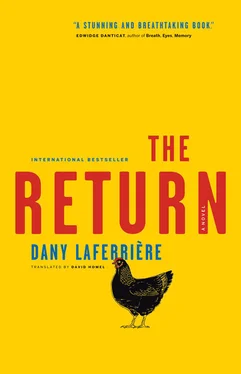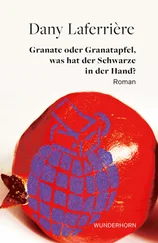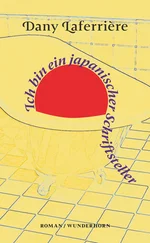I wonder
when he knew
he would never
return to Haiti
and what exactly he felt
at that moment.
What did he think about
in his little room in Brooklyn
on those long frigid nights?
Outside was the spectacle
of the liveliest city in the world.
But in that room there was only him.
The man who had lost everything.
And so early in life.
I try to imagine him in his room, the blinds drawn, dreaming of his city so similar to the one described by an angry young Césaire: “And in this inert town, this squalling throng so astonishingly detoured from its cry as this town has been from its movement, from its meaning, not even worried, detoured from its true cry, the only cry you would have wanted to hear because you feel it alone belongs. . ” The cry is still stuck in the poet’s throat.
My uncles said I should meet his only friend in New York, a barber on Church Avenue. He hadn’t wanted to attend the funeral. I always told Windsor I wouldn’t go to his funeral. For two good reasons. One: I don’t believe in death. Two: I don’t believe in God. . But that being said, I welcome with all due honor the son of my last friend in this shitty life.
A customer wanted to assure him of his friendship. First, you’re not dead, and then you’re not Windsor. He comes and stands in front of me. You look a lot like him. I’m not talking about physical resemblance, that’s for fools who can’t see any farther than their noses. What I mean is that you were carved from the same tree. Let me explain. Everyone laughs. Professor, says my Uncle Zachée, we all understand what you mean. If you say so. . So then, young man, take a chair. And you can scram, he says to another customer waiting to be looked after. I can wait, I say, and go and sit near the washroom. Look, wasn’t I right to say they were carved from the same tree? There are plenty of empty chairs and he goes and sits in the corner, in Windsor’s spot. He used to drink his coffee right there, every morning for forty years. Only I could make it for him — me and no one else. Not even my wife who loved him and did his washing. Don’t listen to people who tell you that Windsor walked around in dirty clothes; that’s not true. His wife, standing next to the big portrait of Martin Luther King, agrees. She went to the funeral because she still believes in God. As if I’m not enough for her. Everybody laughs. Not him. Okay, now it’s your turn, Windsor. Windsor is dead and buried, Professor, a customer says. That’s my name too, I say. Why are they in such a hurry to waste their breath? That’s something I’ll never understand about these people. Only two men have the right to express themselves at all times and they’re both dead. One was a prophet, and that’s Martin Luther King. The other was a madman, and that’s Windsor. So shut up, the rest of you. I told you Windsor isn’t dead. You went to his funeral and the whole time he’s been sitting here quietly. In his spot. That’s how I inherited the chair near the washroom.
My uncles hold hands
as they walk to the bank.
Like children afraid
of losing their way in the forest.
That little act speaks for all their distress.
“Your father,” Uncle Zachée speaks into my ear,
“walked straight ahead
as if he always knew where he was going.”
Several people turn to look as we go by.
We want to retrieve the suitcase my father deposited at the Chase Manhattan Bank. Since I have the same first name, the employee gives me the key to his safety deposit box and asks me to follow him into the bank’s vault. I step inside quietly with my uncles. That quality of silence exists nowhere but in a bank, a church or a library. Men fall silent only before Money, God and Knowledge — the great wheel that crushes them. All around us, small individual safety deposit boxes filled with the personal belongings of New York, city of high finance and great misery. The employee leaves us alone. I open my father’s box and discover an attaché case inside.
I try to open it before realizing I need the secret code. Numbers and letters. We try everything: his birth date and his different given names, my birth date and my pseudonym. My uncles give me all sorts of possible leads, even the date their childhood friend met a violent death. As a last resort, we try his last telephone number before his mind went adrift. Nothing works. In the end, the employee returns, and we have to put the suitcase back. I could not have taken it with me without first answering a battery of questions that would have unmasked me. I slip the suitcase back into the safety deposit box. The employee closes the great vault of the Chase Manhattan Bank behind us.
My uncles stand in disbelief
in front of the iron door.
I feel light
not having to carry such weight.
The suitcase of aborted dreams.
One of my uncles, the youngest,
suddenly takes me by the arm.
We almost slip on the wet pavement.
Your father was my favorite brother.
He was a very discreet man.
With each of us he maintained
a separate relationship.
Even if he always refused to live with us
he was very present in our lives.
In his own way, he concludes with a wink.
We choose a booth near the window in a restaurant that smells very strongly of fried food, where my father would eat his breakfast in Manhattan. The young waiter rushes over. Can we still have breakfast? my Uncle Zachée asks. We serve breakfast twenty-four hours a day here. And we always will as long as someone in New York wants bacon and eggs and home fries. My Uncle Zachée motions me over. He wants to introduce me to the owner’s wife who knew my father very well. She has very white arms, a little mustache and that light in her eyes. Your father ate lunch here every day. I wouldn’t let him pay once I knew his story. I couldn’t have every exile eating here for free — you can imagine how many there are in New York. But his journey reminded me of my husband’s. Both of them were journalists and ambassadors before they got crossed off the list. My husband was ambassador to Egypt and Denmark. At first they talked about foreign policy the whole time. That was my husband’s passion. I bought this restaurant so he could meet friends from his country and talk politics. Your father always went to the cash before he left. He never took my generosity for granted. I would refuse but he insisted. I handed him back his money as if I were giving him his change. He stuffed it in his pocket — not the type to count it. Did he even know what I’d done? She laughs softly. I didn’t do it out of pity. It was mostly for my husband. I knew your father would never come back if he thought he wouldn’t be allowed to pay. So I arranged it so we’d meet at the cash. And your husband? That’s him by the window. Sometimes he’s okay, sometimes not. He’s been expecting your father all week. I can’t bring myself to tell him he’s dead.
I was four or five
when my father left Haiti.
He was in hiding more often than he was at home.
Here is the man at the origin of my life
and I don’t even know how he tied his tie.
In the stifling loneliness of exile
one day he had the grand idea
of entrusting a suitcase to the bank.
I picture him strolling through the streets
after having put in a safe place
his most precious possession.
The suitcase was waiting for me.
He had faith in his son’s reflex.
What he didn’t know
(shut up, you can’t teach a dead man anything)
is that destiny is not passed on from father to son.
That suitcase belongs to him alone.
The weight of his life.
Читать дальше












